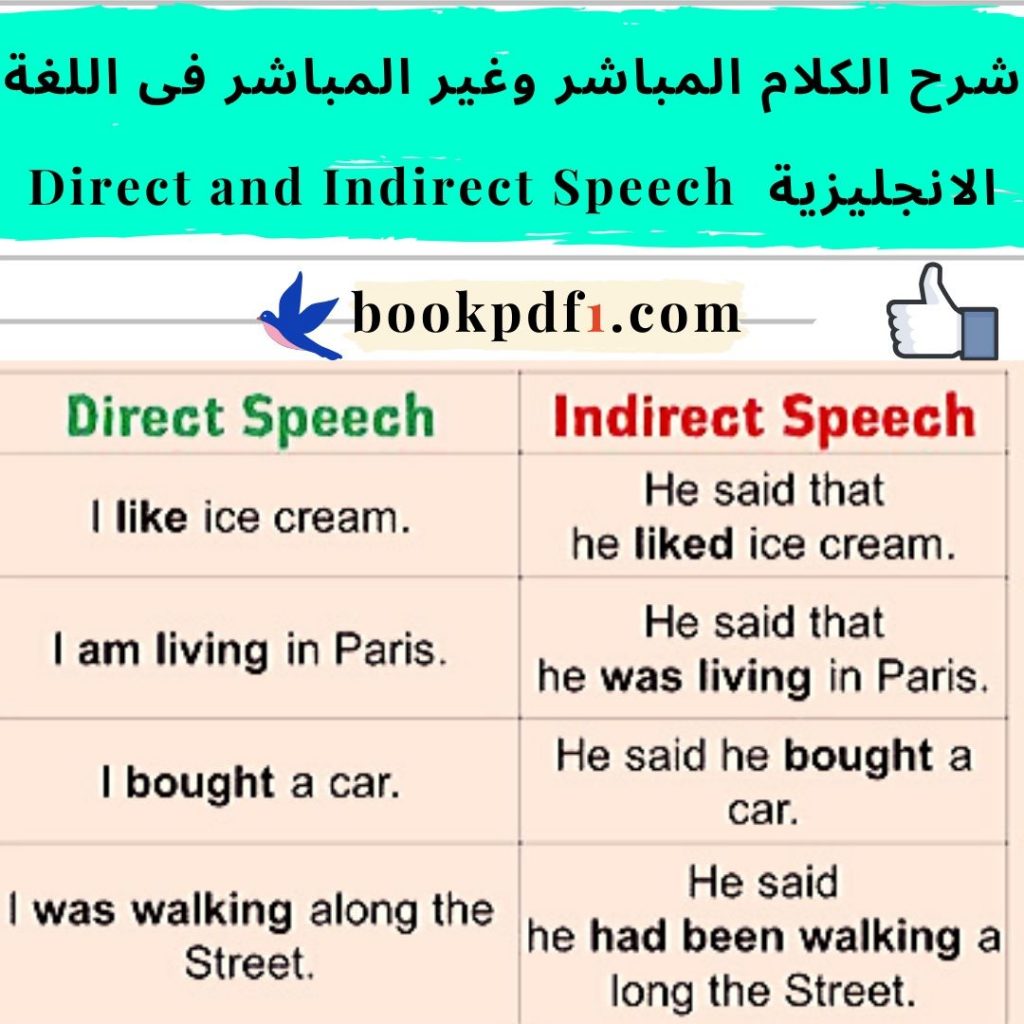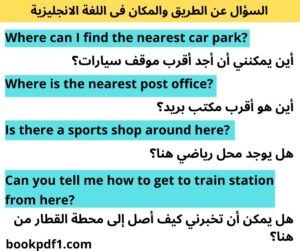شرح الكلام المباشر وغير المباشر فى اللغة الانجليزية Direct and Indirect Speech بطريقة مبسطة وسهلة لفهم قواعد اللغة الانجليزية.
الكلام المباشر وغير المباشر Direct and Indirect Speech
تحويل الجمل الخبرية من كلام مباشر إلى غير مباشر :
الكلام المباشر ( Direct Speech ) هو الكلام الذي يأتي على لسان أحد ما مباشرة كما ينطقه هو ، ويوضع الكلام المباشر بين علامتی تنصيص .
أما الكلام غير المباشر ( Indirect Speech ) فهو الكلام الذي ينقله شخص ما عن شخص آخر ، ولا يوضع الكلام غير المباشر بين علامتی تنصيص .
لتحويل الجملة الخبرية من كلام مباشر إلى غير مباشر نقوم بما يلي :
1. نحول فعل القول ( said to ) إلى ( told ) ، أما ( said ) فلا تتغير.
2. يتم حذف الأقواس ونربط جملة فعل القول بالجملة الأصلية بكلمة( that ) .
3. يتم تغيير الضمائر بما يتوافق مع المتكلم والمخاطب .
4. بالنسبة للأفعال فإن المضارع البسيط يتم تحويله إلى ماضي بسيط ، والماضي البسيط يتم تحويله إلى ماضي تام أو يمكن أن يظل كما هو ، والمضارع التام يتم تحويله إلى ماضي تام و المضارع التام المستمر يتم تحويله إلى ماضي تام مستمر –
ويتضح ذلك من تحويلات الفعل يأكل ( eat ) على سبيل المثال :
شرح الكلام المباشر وغير المباشر فى اللغة الانجليزية من خلال الازمنة:
| Indirect speech | Direct speech |
| Simple past :She said (that) she wanted to eat pizza | Simple present :I want to eat pizza |
| Past continuous: She said (that) she was eating pizza. | Present continuous: I am eating pizza |
| Past perfect : He said (that) he had eaten pizza from Giorgio’s before | Present perfect :I have eaten pizza from Giorgio’s before |
| Past perfect : He said (that) he had eaten pizza the night before | Simple past:I ate pizza last night |
| Would : They said (that) they would always love pizza | Will: We will always love pizza |
| Could :They said (that) they could eat pizza every day | Can: We can eat pizza every day |
5- يتم تحويل الظروف الزمنية وأسماء الإشارة كما يلي ( إلا إذا لم يحدث تغيير في الزمان أو المكان ) :
| Indirect speech | Direct speech |
| then | now |
| that | this |
| that day | today |
| the day before | yesterday |
| the week before | last week |
| before | ago |
| there | here |
| those | these |
| that night | tonight |
| the next day | tomorrow |
| the following week | next week |
مثال 1
He said to me, « I am a famous writer. » ( direct speech)
قال : ” أنا كاتب مشهور “. ( كلام مباشر )
He told me that he was a famous writer. (indirect speech )
لقد أخبرني أنه كان كاتب مشهور . ( كلام غير مباشر )
مثال 2
She said, «I felt hungry. » (direct speech )
قالت : ” أنا شعرت بالجوع ” . ( كلام مباشر)
She said that she had felt hungry. (indirect speech )
لقد قالت أنها شعرت بالجوع. ( كلام غير مباشر )
مثال 3
He said, « If my children were older, I would emigrate. » ( direct speech )
قال : لو كان أطفالي أكبر سنا ، لكنت هاجرت . ( كلام مباشر )
He said that if his children were older, he would emigrate. (indirect speech )
لقد قال أنه لو كان أطفاله أكبر سنا لكان هاجر . ( كلام غير مباشر )
يلاحظ من هذا المثال ما يلي : – الأفعال مثل ( ………would , should , might , could) تبقى كما هي عادة عند التحويل من الكلام المباشر إلى غير المباشر.
. يظل الفعل الماضي في الجملة الشرطية كما هو عند التحويل من كلام مباشرإلى غير مباشر.
مثال 4
He said, « Yes, I will do it. » ( direct speech )
قال : نعم سوف أقوم بهذا . ( كلام مباشر)
He agreed to do it. ( indirect speech )
لقد وافق على القيام بهذا . ( كلام غير مباشر )
كما نرى في هذا المثال ، فإنه إذا كانت جملة الكلام المباشر تبدأ بكلمة ( yes ) فإنها تحذف عند تحويلها إلى كلام غير مباشر وتستبدل بكلمة ( agreed ) أو ما يقابلها ، وكذلك إذا كانت جملة الكلام المباشر تبدأ بكلمة ( no ) فإنها تحذف عند تحويلها إلى كلام غير مباشر وتستبدل بكلمة ( refused ) أو ما يقابلها .
مثال 5
He said to me, « I have enjoyed the meal. » ( direct speech )
قال لي : لقد استمتعت بالوجبة . ( كلام مباشر)
He told me that he had enjoyed the meal. ( indirect speech )
لقد أخبرني أنه استمتع بوجبته . ( كلام غير مباشر )
مثال 6
She said, “I was watching a film this evening. » ( direct speech )
قالت : كنت أشاهد فيلما هذا المساء . ( كلام مباشر)
She said that she had been watching a film that evening. (indirect speech)
لقد قالت أنها كانت تشاهد فيلما ذلك المساء . ( كلام غير مباشر )
مثال 7
He said to me, « I am going to the hospital. » ( direct speech )
قال : سوف أذهب إلى المستشفى . ( كلام مباشر)
He told me that he was going to the hospital. (indirect speech)
لقد أخبرني أنه سوف يذهب إلى المستشفى . ( كلام غير مباشر)
مثال 8
He said, « I will travel tonight. » ( direct speech )
قال : سوف أسافر الليلة . ( كلام مباشر )
He said that he would travel that night. ( indirect speech )
لقد قال أنه سوف يسافر تلك الليلة . ( كلام غير مباشر)
تحويل صيغة الاستفهام من كلام مباشر إلى غير مباشر :
1- يحول فعل القول إلى ( asked ) أو أي فعل آخر يدل على الصيغة الاستفهامية .
2- يتم حذف الأقواس وتستخدم كلمة الاستفهام كأداة ربط ، وفي حالة عدم وجود أداة استفهام في السؤال نستخدم ( if ) أو ( whether ) كأداة ربط .
3- نقوم بتقديم الفاعل على الفعل لتحويل السؤال إلى جملة .
4- نقوم بتطبيق خطوات تحويل الجملة الخبرية من كلام مباشر إلى غير مباشر .
5- يتم حذف علامة الاستفهام ووضع نقطة بدلا منها في نهاية الجملة .
مثال 1
Samy said to me, « Where have you been ? » ( direct speech )
قال لي سامي : ” أين كنت ؟”
Samy asked me where I had been. (indirect speech )
سألني سامي عن المكان الذي كنت به .
مثال 2
I said to her, « When are you going to visit me ? » ( direct speech )
قلت لها : ” متى سوف تقومين بزيارتي ؟ “
I asked her when she was going to visit me. ( indirect speech )
سألتها عن الموعد الذي ستقوم فيه بزیارتی .
مثال 3
He said to me, « Did you see Mohamed ? » ( direct speech )
قال لي : ” هل رأيت محمد ؟”
He asked me if I saw / had seen Mohamed. ( indirect speech )
سألني عما إذا كنت قد رأيت محمد أم لا.
يجب الملاحظة هنا أنه عند تحويل الفعل الماضي البسيط ( saw ) من كلام مباشر إلى غير مباشر فإنه إما أن يبقى في الماضي البسيط ( saw ) أو يتم تحويله إلى ماضي تام ( had seen ).
مثال 4
She said to her, « Have you seen the Pyramids ? » ( direct speech )
قالت لها : ” هل رأيت الأهرامات ؟”
She asked her whether she had seen the Pyramids. ( indirect speech )
لقد سألتها عما إذا كانت قد رأت الأهرامات أم لا.
تحويل الأمر من كلام مباشر إلى غير مباشر :
1- يحول فعل القول إلى (ordered ) أو ما يقابلها إذا كان الكلام موجه من شخص كبير إلى شخص صغير ، ويحول إلى ( told ) إذا كان الكلام بين شخصين متساويين ، ويحول إلى ( begged ) إذا كان الكلام موجه من شخص صغير إلى شخص كبير ، ويحول إلى ( advised ) عند النصيحة .
2- يتم حذف الأقواس وتستخدم ( to ) کرابط في حالة الإثبات و ( not to ) في حالة الأمر المنفي ثم يأتي فعل الجملة في نفس الزمن .
مثال 1
My friend said to me, « Call me this evening. » ( direct speech )
قال لي صديقي : ” اتصل بي هذا المساء”.
My friend asked me to call him that evening. ( indirect speech )
طلب مني صديقي أن أتصل به ذلك المساء .
مثال 2
The father said to his son, « Do not play in the street. » ( direct speech )
قال الأب لابنه : ” لا تلعب في الشارع ” .
The father ordered his son not to play in the street. ( indirect speech )
أمر الأب ابنه بالا يلعب في الشارع .
مثال 3
The servant said to his master, « Please, let me leave early tonight. » ( direct speech )
قال الخادم لسيده : ” من فضلك أسمح لي بأن أغادر مبكرا الليلة “.
The servant begged his master to let him leave early that night. (indirect speech)
ترجي الخادم سيده أن يسمح له بأن يغادر مبكرا في تلك الليلة .
مثال 4
The doctor said to the patient, « Stop eating fast foods. » ( direct speech )
قال الطبيب للمريض : ” توقف عن أكل الأطعمة السريعة “.
The doctor advised the patient to stop eating fast foods. ( indirect speech )
نصح الطبيب المريض بان يتوقف عن أكل الأطعمة السريعة .
تحويل صيغة التعجب من كلام مباشر إلى غير مباشر :
1- يتم تحويل فعل القول ( said ) إلی ( exclaimed ) ، و ( said to ) إلی. ( told )
2- يتم إضافة كلمات توحي بنوع التعجب الموجود في الجملة مثل :
بدهشة – – – – –> with surprise
بأسف – – – –> with sorrow
بفرح – – –– –> with joy
بحزن – – – –> with sadness
بإعجاب – – – –> with admiration
3- يتم حذف الأقواس واستخدام ( that ) کرابط .
- يتم حذف كلمات التعجب مثل : ( !Oh ! – Alas ! – How ! – What ! – Hurrah)
- يتم تغيير الأزمنة والضمائر كما هو الحال عند تحويل الجملة الخبرية من كلام مباشر إلى غير مباشر.
مثال 1
He said, « Alas ! I have lost all my money. » ( direct speech )
قال : ” يا إلهي ! لقد خسرت كل أموالي “.
He exclaimed with sorrow that he had lost all his money. (indirect speech)
بدت عليه علامات التعجب والحزن لفقده كل أمواله .
مثال 2
She said, « How nice the picture is ! » ( direct speech )
قالت : ” ما أجمل هذه الصورة ! “
She exclaimed with admiration that the picture was nice. (indirect speech)
لقد بدت عليها إمارات الإعجاب لأن الصورة جميلة .
مثال 3
He said, « Hurrah ! I have gained the top prize. » ( direct speech )
قال : ” مرحي ! لقد فزت بالجائزة الكبرى”.
He exclaimed with joy that he had gained the top prize. ( indirect speech )
لقد بدت عليه علامات التعجب والفرح لأنه ربح الجائزة الكبرى .
مثال 4
He said, « Good Heavens ! The man has fallen dead. » ( direct speech )
قال : ” يا إلهى ! لقد سقط الرجل جثة هامدة”.
He exclaimed with surprise that the man had fallen dead. (indirect speech)
لقد بدت عليه إمارات التعجب والأسى لأن الرجل قد سقط جثة هامدة .
مثال 5
I said, « How beautiful your flat is ! » ( direct speech )
قلت : ” ما أجمل شقتك !”
I exclaimed with admiration that his flat was beautiful. ( indirect speech )
تعجبت كيف أن شقته جميلة .
شرح الكلام المباشر وغير المباشر فى اللغة الانجليزية 15 مثال
15 Examples of Direct & Indirect Speech
| Mary said, “I have been writing this essay.” | Direct |
| Mary said that he had been writing that essay | Indirect |
| Michael said, “I may go there | Direct |
| Michael says that she may go there | Indirect |
| My father said, “I am cooking dinner. | Direct |
| My father said he was cooking dinner | Indirect |
| I am reading a book, he explained | Direct |
| He explained that he was reading a book | Indirect |
| I said, “He is driving a car” | Direct |
| said that he was driving a car | Indirect |
| George is said, “I write a letter” | Direct |
| George is said that she wrote a letter | Indirect |
| We can’t go the zoo next week | Direct |
| They said they couldn’t go to the zoo next week | Indirect |
| My sister said, “I had already eaten | Direct |
| My sister said she had already eaten | Indirect |
| My boyfriend asked, “Do you like horror films? | Direct |
| Do you like horror films? my boyfriend asked | Indirect |
| I never get up late, my mother said. | Direct |
| My mother said that she never got up late | Indirect |
| She said, “I might come early. | Direct |
| She said she might come early | Indirect |
| I am leaving home now. | Direct |
| He said that he left home then | Indirect |
| Are you living here? | Direct |
| He asked me if I was living here | Indirect |
| I’m going to come. | Direct |
| She said that she was going to come | Indirect |
| We can communicate smoothly. | Direct |
| They said that they could communicate smothly | Indirect |
طريقة سهلة لفهم قواعد الكلام المباشر وغير المباشر فى اللغة الانجليزية (الضمائر)
| Indirect | Direct Speech | Indirect | Direct Speech |
| Him, her | Me | He, she | I |
| Them | Us | They | We |
| Him, Her, them | You | He, she, they | You |
| His, hers | Mine | His, her | My |
| Theirs | Ours | Their | Our |
| His, hers, theirs | Yours | His, her, their | Your |
الصفات Adjectives في اللغة الإنجليزية شرح مبسط لقواعد الانجليزية




Thanks
Thanks
جدا رائع
احبكم
بعض الامثله متحوله خطأ
ممكن تذكر الامثلة
” Ahmed :”Igo to school every
تحول every إلى ماذا
Direct Speech
simple present
He said, “I go to school every day.”
Indirect Speech
simple past
He said (that) he went to school every day.
اعتقد انها لا تتحول
” Ahmed :”Igo to school every
تحول every إلى ماذا
تم الرد
Nadia said “this is my son ”
Transfer to indirect
That’s her son, she said.
شكرا بارك الله فيكم
كفو كفو كفو
100% تسلمو
.Ali said “this week, I have read 3 stories “Transfer to indirect
Ali said that he had read three stories that week.
“Ali said “this is the best Day
Transfer to indirect
Ali said that it was the best day.
Direct she said “where are you from”?
What’s indirect?
Indirect Speech: She asked where I was from.